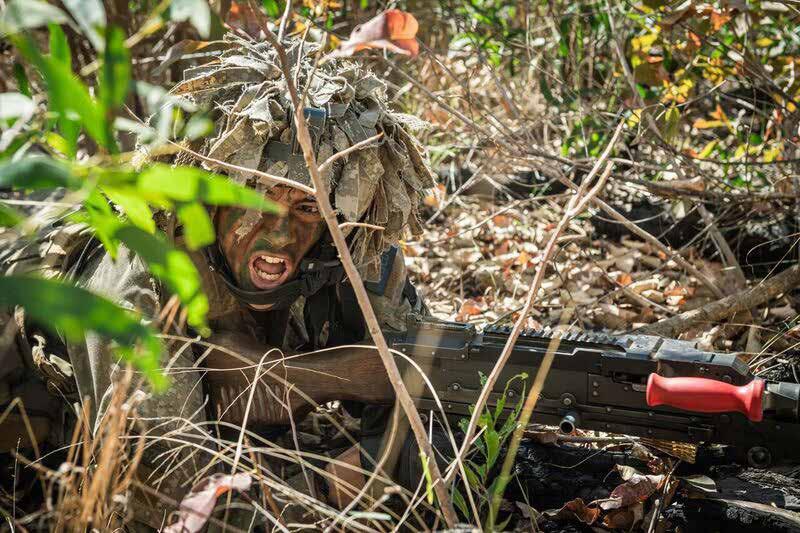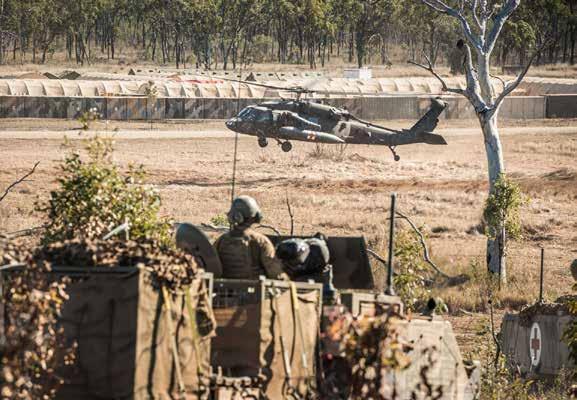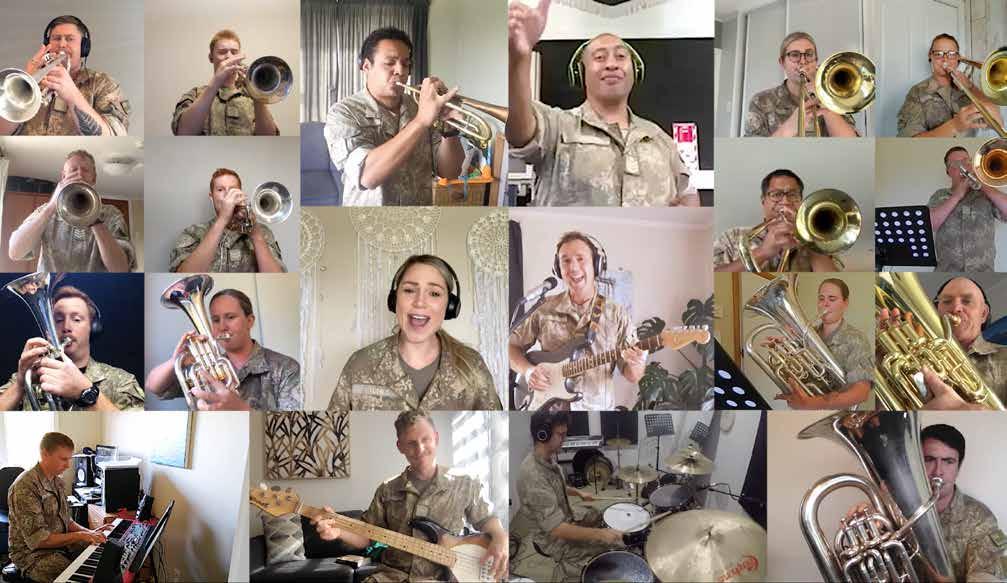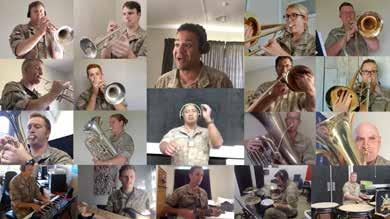
8 minute read
CA’s writing competition
A MESSAGE FROM CHIEF OF ARMY
As we enter Alert Level 1 let me pick up on one of the key themes from the Land Component Commander’s article in the last Army News – his reference to the new operating environment and the need to adjust and reset our approach to training to regenerate the force.
Advertisement
Two things stand out for me from this commentary. Firstly, the LCC outlined the reworked training plan for the Army from now until the end of 2021. He described the reset of individual and collective training, and identified critical joint and combined arms training activities. Importantly, the LCC then acknowledged that our junior commanders have shown they have the skills, attitude and drive to lead our training through this reset. On this last point I couldn’t agree more.
Responding effectively to Covid-19 demanded that we delegated authority to the lowest level and that we had complete trust in our junior commanders. To their immense credit, our junior officers and NCO’s have proved themselves able to make sense of the unexpected, modify their leadership style to best suit the requirements of an incredibly unique environment, and have the confidence to take ‘intelligent initiative’. What these men and women have done in the last two months has been impressive and I am incredibly proud of the manner with which they executed their responsibilities, and I thank them for it.
As we look as an Army to ‘adjust and reset’ it’s important that all of us who have command responsibilities reflect on our leadership during Covid-19, on how we adjusted to the changes the virus imposed on our environment, whether we were successful or otherwise, but most importantly what were the lessons we can take away from the last two months. Here are a couple of initial observations.
Firstly, effective Mission Command enabled Army to be both agile and adaptive in challenging, quite unique circumstances. Throughout lockdown senior leaders had critical roles to play in shaping the environment and communicating key messages but it has been at the ‘coal face’ where trusted personal relationships and team cohesion have been so critical. Whilst communications did prove a challenge it was clear that the direction provided by senior leadership enabled effective low level planning and decision making by our junior commanders and, as a result, our people were able to respond to Covid-19 in a timely and effective manner.
Key to these outcomes was trust. Trust is the foundation for effective fighting teams and it should be no surprise that trust was critical to the unity of effort, initiative, tempo, and teamwork that has been achieved by Army over the last two months. US General (Rtd) Jim Mattis describes the importance of trust to the military. ‘When the spirit of your team is on the line and the stakes are high, confidence in the integrity and commitment of those around you will enable boldness and resolution; a lack of trust will see brittle, often tentative execution of the best-laid plans. Nothing compensates for a lack of trust’.
My final observation is just how important it is to be able to adapt your leadership style to changes in the environment, your mission, and the needs of your team – to acknowledge that no one style of leadership is appropriate to every instance. Covid-19 was something very different, it affected us all in different ways, and it required a very different response. As we place a greater emphasis on our ability as an Army to undertake population based operations around the world, demonstrating this leadership agility in the future will be critical to mission success. If we wish to create conditions through the commitment of military forces that are enduring, then we have to do so in such a way as to create outcomes that have a very clear value-proposition for the individuals and communities with whom we are interacting.
Over the coming months, as we adjust and then reset our approach to training, none of us should lose sight of what has been so important to our Army during lockdown. Mission Command remains fit for purpose for not just high end operations in the contemporary environment but across the spectrum of military activity and we must continue to develop commanders who are comfortable in its application. We must not only trust our people but convey that trust in a manner that subordinates can both sense and gain strength from. Finally, no two situations are the same – no one leadership style suits every circumstance. All of us must be comfortable with this and our training must reflect it.
In the same way Mission Command, trust and adaptive leadership proved so critical to our Covid-19 response they will be key to our future force regeneration plans.
John Boswell Major General

Results and placing for CA’s writing competition
In April this year we launched Army’s bi-annual writing competition to promote critical thinking and professional development.
The approach to life-long learning and the launch of our new Knowledge Enabled Army (KEA) professional development website has been timely given the recent Covid-19 challenge. I felt strongly about this initiative and it has been a pleasure to both promote and sponsor this activity.
Overall 37 submissions were received from which a final 28 were accepted for moderation and review. A TRADOC moderation panel assessed the submissions and narrowed the field. I thoroughly enjoyed reading the finalists entries. It was clear to me that each contributor made a significant commitment to produce a submission that was thought provoking, resourceful and imaginative, I congratulate and thank you for that.
It gives me great pleasure to announce the following placements in the rank-group categories.
First Place Winners
1.
2.
3. Army Officer Category.
Major S McCulloch – “Warfare has moved from Melee to Mass, to Manoeuvre. What is the next evolution?” Army Soldier Category. Corporal A Blackman – “Resilience – Enabling our soldiers”
Army Civilian Category.
Mr J Tunnage – “Reclaim the Night – Night Vision Equipment (NVE)”
Overall placing
1st
2nd
3rd Army Officer Category MAJ Sean McCulloch CAPT Laurence MacIntosh LTCOL Roz Michie Army Soldier Category CPL Alana Blackman WO2 Kelly Carter
WO2 Robert McKie Army Civilian Staff
Mr Justin Tunnage (Justin is also a Reserve Force 2 nd LT)
I want to thank all participants for your efforts. Every submission provided unique insights and made interesting reading, but what led me to choose the winners was the depth of consideration and the differing viewpoints the authors considered. As the writing competition gains momentum, I look forward to seeing more people take part and share their thinking, opinions and

professional perspectives. Taking the extra effort, as you have, to think clearly about our profession challenges us all to better consider both what we do, and our direction of travel. Good work.
John Boswell, Major General Chief of Army
ARMY BAND VIDEO LOCKDOWN LOVE

By Charlene Williamson
The New Zealand Army Band did what they do best during the Covid-19 lockdown; entertain the masses, but from the comfort of their living rooms.

The band reached close to five million people from around the world with their lockdown videos, with a large majority of views from the United Kingdom.
Major Graham Hickman, Army Band Director of Music, said the response from around the world was stunning.
“The aim of the videos was to provide entertainment and solace to people around the world during lockdown, performing upbeat, humorous and entertaining songs, however we didn’t quite expect such a huge response,” he said.
The concept of the videos initially came from an idea to pre-record an Anzac Day commemoration concert and a few entertaining songs to release onto their social media channels.
“A number of the younger troops suggested using software applications to record ‘isolation bubble’ performances”.
“We immediately figured that if we could get the process to work, we could publish both an Anzac concert and some great entertaining songs during lockdown,” said MAJ Hickman.
The videos created by the band were released onto the NZDF official social media channels including Facebook, Instagram, YouTube and Twitter, as well as the Army Band’s social media channels.
The best performing video was the bands rendition of “Friend Like Me” from Disney’s Aladdin. It saw more than 800,000 views and reached more than 1.7 million people around the world. Closely following that the video “Signed, Sealed, Delivered” by Stevie Wonder had more than 790,000 views and reached more than 1.65 million people.
MAJ Hickman said the videos took “many, many hours” to complete and said there was quite a process from the beginning to the final product.
After selecting a song, the Bandmaster would detail the musicians, distribute the music, delegate the form of each song, then each musician would rehearse their music, while the Bandmaster made a master video of himself conducting.
The next step was for the Rhythm Section (drums, guitars, keyboard) to record their parts. These parts would then be edited together into a master track by one of the band members (a sound technician). Following this each individual musician would record their parts to the master track. These were emailed to the sound and video technicians, and all the music/video was edited and collated.
“Luckily we have a number of clever Privates and Junior Non-Commissioned Officers, so the really long hours editing audio and video were shared around a few different people,” said MAJ Hickman.
He said that the videos also helped with morale. The band was one of three units to provide camp security for Burnham Military Camp during the seven weeks of Level Three and Four lockdown. This task had the potential to challenge morale. However, as almost the entire unit was also involved in recording and producing the videos, it gave everyone a creative purpose and direction during the long lockdown.
“This was a new process for the band. Luckily the troops had the agility and discipline to work through their individual challenges and make it work.
“Once the first videos were published they saw how good the finished products were, and the fantastic response they were getting worldwide. This really boosted morale during lockdown,” said MAJ Hickman.
The success of the videos online has meant they’ve had requests for collaborations from around the world.
“We are now working on a dozen other online collaborations with various groups and organisations, including the US Air Force, the Australian Army, and most of the military and police bands from around the Pacific,” he said.









